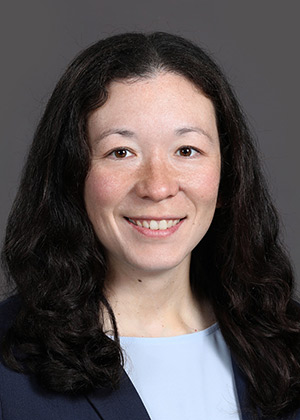By Andrew Cohen
Given her four years of active duty as a Navy surface warfare officer in the Pacific fleet, you wouldn’t think a blank piece of paper could trouble Gibson Dunn associate Courtney Wang ’20. But among the many lessons she gleaned from her military service, humility and self-awareness ranked right near the top.

“I found that the best leaders were the ones who assumed they didn’t know everything and always sought the input of people around them when making decisions,” Wang told Berkeley Law students during a recent Leadership Lunch Series event with three other members of her firm.
Those traits served Wang well in navigating to her chosen practice area; in particular, admitting that she did not enjoy writing briefs from scratch: “I get anxious seeing a blank page and not knowing where to start. That’s one reason I veered away from litigation and moved into corporate work, where you have a lot of pre-formed templates you can adapt and customize to what you’re doing.”
Self-awareness and proactively carving out a unique professional niche has served her well. Practicing in Gibson Dunn’s Technology Transactions Practice Group, Wang provides valued counsel on myriad tech deals, and helps companies develop sound privacy and data protection strategies.
From her point of view, success at the nexus of tech deals and data privacy requires traditional transactional skills, such as negotiating licenses and acquisition agreements, as well as understanding the regimes a product is subject to and what its compliance risks entail.
“I really like learning new businesses and I like seeing the solutions humanity comes up with to solve big problems,” Wang said. “My job is to learn those solutions, how they work, and how they make money.”
The right mix
While working at this intersection admittedly occupies a unique law practice space, Wang says tech transactions and privacy naturally fit with one another — and that her law school training paved a smooth road to melding them.
“The most important gift Berkeley Law gave me was exposure to so many niche issues, which gave me leads on the kind of work I might be really interested in, and how I could sample different kinds of matters that focused on my interests,” she explains. “I remember several of my transactional classes being really good. The foundational business classes, like Business Associations and Securities Regulation, prepared me well to understand businesses for my current transactional work.”
Wang added that the influential class she took was Privacy with Professor Paul Schwartz.
“For the first time, I was introduced to a subject in law that didn’t seem to be bounded by a specific practice area,” she said. “That really spoke to me, because I had struggled with defining an affinity for transactional work or litigation.”

As a communications officer early in her Navy service, Wang learned the basics of computer networks and radio communications. That served as a foundation for her interest in how information moves around society and how we protect it.
At the Leadership Lunch series event, presented by our Berkeley Center for Law and Business, Wang said she works on an average of five matters in a day with 10 to 15 on her overall docket. Splitting time between data privacy work and intellectual property deals, she conducts diligence review, shapes privacy strategies, and assesses data protection options.
Close client connections
Her unique niche also enables early-career interaction with clients.
“I like examining the cost in personal autonomy we pay for tech solutions — how companies build privacy policies, and how they collect and use data,” Wang says. “Helping companies come into compliance with data privacy laws and build better relationships with their consumers, there’s real satisfaction in knowing I can add transparency to the consumer experience while serving my clients as well.”
With business law and technology law increasingly connected, especially in the privacy space and in the context of tech transactions and corporate mergers and acquisitions, Wang sees modern deals increasingly requiring specialists who understand how products work and how companies comply with data privacy and security requirements.
Grappling with some of society’s emerging crucial issues, from cybersecurity to artificial intelligence, she works closely with innovations in data collection, marketing technologies, and automated decision-making — a tool quickly becoming ubiquitous in apps and other everyday technology.
“I’m really lucky to have worked on matters that are new to everyone,” she says. “Learning new technology means you’re also on the forefront of figuring out how different laws should apply to it, and fundamentally what it should and shouldn’t be permitted to do to align with a business’s overall compliance interests.”
Noting that lawyers who work in the space between products and the law carry a huge responsibility, Wang adds, “It’s our job to help balance innovation and compliance. I get to see my work in so many ways, but one I really cherish is improved transparency between businesses and consumers, which I think benefits everyone.”